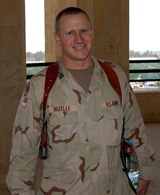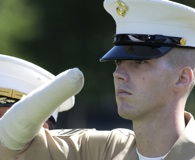Wounded Warriors: James Wright and David Rozelle
"Dispatches" in the July 2010 issue of Armchair General includes the stories of three men wounded in Operation Enduring Freedom in Afghanistan or Operation Iraqi Freedom: Army Staff Sergeant Jonathan W. Hosley; Marine Corporal Garrett S. Jones; and Green Beret Sergeant First Class John "Mike" Fairfax. Below, we present the inspirational story of two other wounded warriors who refuse to let their injuries destroy their lives.
Amputee Blazes New Trails On, Off the Battlefield
WASHINGTON (Army News Service, May 25, 2007) – Maj. David Rozelle learned early the importance of leading from the front and setting the example for his fellow Soldiers.
But his ability to lead was tested June 21, 2003, when a landmine struck his vehicle a few miles west of Baghdad and he lost his right foot.
{default}For most, this would have been a devastating, life-changing event. For this native Texan, it was only a speed bump.
"Growing up, I was taught that I can accomplish anything if I wanted it," he said. "I wanted to continue to lead Soldiers and serve my country."
Maj. Rozelle’s chain of command told him he could return to duty with the 3rd Armored Cavalry Regiment if he recovered from his injury. The chance to return to his unit in Iraq was all he needed to prove his physical ability – despite an amputation and the concern of Families and friends.
After eight months of rehabilitation at Fort Carson, Colo., Maj. Rozelle was ready to show he was combat-ready. 

"When the Army puts an officer in charge of troops, it wants to make sure that the individual can get it done – lead them into battle and be successful," said Maj. Rozelle, who is now administrator for the Amputee Care Center at Walter Reed Army Medical Center in Washington, D.C.
 "When I took my Oath of Office, it never mentioned giving up if I was injured. It was my responsibility as a leader to lead from the front and return to duty," he said.
"When I took my Oath of Office, it never mentioned giving up if I was injured. It was my responsibility as a leader to lead from the front and return to duty," he said.
In March 2005, almost 20 months after being injured, Maj. Rozelle found himself in familiar territory – in Iraq and serving as commander of a cavalry troop. He was the first troop commander to redeploy to the same battlefield as an amputee in recent military history.
Today the major finds himself at Walter Reed doing the same thing he’s always done – leading from the front and setting the example. This time, it’s fellow amputees benefiting from Maj. Rozelle’s counsel, experiences and motivational techniques.
"I’ve been there," said Maj. Rozelle, who spends the bulk of his duty day establishing programs and systems for the new Military Advanced Training Center, which is scheduled to open this fall.
"I want to help them realize there is life after this kind of injury. If they work hard and have the right mind set, anything is possible."
When he’s not inspiring Walter Reed patients and helping complete a state-of-the-art facility that will improve Walter Reed’s capacity to care for amputee patients, Maj. Rozelle competes in marathons and triathlons, and also snow skis.
"I’m 34 years old with a beautiful wife and two great kids," he said. "I have started a whole new life, and only hope to be a good example for my boys."
Maj. Rozelle was awarded the Bronze Star with Valor for actions in combat. He is also author of the New York Times Best Seller "Back in Action: An American Soldier’s Story of Courage, Faith and Fortitude."
Article by Terry J. Goodman, Deputy Public Affairs Officer for Walter Reed Army Medical Center.

* * *
Double amputee still serves Corps as martial arts instructor
Throughout the annals of Marine Corps history, inspired quotations have framed the heroics of great Marines, transforming passing moments into epic legends to be forever retold and celebrated by the generations of warriors who follow.
Never to be forgotten is the rallying cry of Gunnery Sgt. Dan Daly at the Battle of Belleau Wood, France, on June 4, 1918: “Come on you sons of bitches! Do you want to live forever?”
Eternally remembered is the retort of Capt. Lloyd Williams three days earlier to a French officer at the suggestion that the Marines withdraw from an entrenched fighting position north of Lucy-le-Bocage, France: “Retreat? Hell! We just got here!”
And renown among all Leathernecks are the words of perhaps the most celebrated Marine, Lt. Gen Lewis B. “Chesty” Puller, at the Chosin Reservoir, Korea, in the Winter of 1950. Puller, then a colonel, learned Chinese forces had completely surrounded his 1st Marine Division, and reportedly told a journalist, “Now we can fire in any direction. The bastards won’t get away this time!”
So too will a contemporary Marine be remembered, not only for his extraordinary act of courage and composure under fire, but for a few plainly spoken words that captured the hearts of citizens and generals alike: “Sir, I couldn’t pass out. I was in charge.”
 Spoken by then-Cpl. James Wright, these simple words epitomized the fighting spirit of the Marine NCO.
Spoken by then-Cpl. James Wright, these simple words epitomized the fighting spirit of the Marine NCO.
Wright, now a sergeant, was retelling the harrowing experience of how he lost both hands and suffered wounds to a leg in an insurgent ambush in Iraq from his hospital bed at Bethesda National Naval Medical Center. Sitting at his bedside was Major Gen. Thomas S. Jones, Training and Education Command commanding general, who was visiting wounded veterans at the hospital that day.
Jones listened to the young reconnaissance Marine explain how he continued to lead his Marines in returning fire and eventually out of the kill zone. Amazed, the general asked how he managed to keep from going into shock and passing out. Wright replied, “Sir, I couldn’t pass out. I was in charge.”
As a corporal, Wright was the assistant team leader with Company B, 1st Reconnaissance Battalion, 1st Marine Division, I Marine Expeditionary Force in Al Anbar Province, Iraq, when his patrol came under intense small arms, mortar and rocket propelled grenade fire in an insurgent ambush. Wright immediately took action, returning fire with his M-249 Squad Automatic Weapon, until an RPG hit his humvee.
The blast severed both of Wright’s hands and severely wounded his left leg. Incredibly, Wright maintained his composure, instructing his Marines to use a radio to call for help and to apply tourniquets to his wounds. Wright also directed his Marines to concentrate fire on enemy machine gun positions, assisting in the demise of 26 enemy fighters. For his actions, Wright was later presented the Bronze Star Medal with combat distinguishing device for valor.
Now facing a medical board that will likely end his career, Wright refuses to sit idly by.
The Marine was offered, and eagerly accepted, a job as a Marine Corps Martial Arts Program instructor at the Martial Arts Center of Excellence here for at least the next several months until he is medically retired from the Marine Corps.
Wright said he was grateful for the chance to return a sense of normalcy to his life. 
“As active as I was as a Marine, it wasn’t in my nature to be sitting around (the hospital) doing nothing,” said Wright. “For me to have the opportunity to come back to work has reintroduced me to my life and my passion to be a Marine. I’m grateful for them giving me a chance to come down here. They didn’t know what to expect, so it was a big step on their part.”
Lieutenant Col. Joseph Shusko, MCMAP director, said Wright is an excellent addition to the instructor cadre at the MACE.
“His character is such that we want him to stay here because he is doing so much for the Corps,” said Shusko. “When he sits and talks to the Marines about exactly what happened to him and he doesn’t pull any punches, that’s all character. It’s beautiful to see and it’s coming from his heart.”
Master Gunnery Sgt. Shane Franklin, MCMAP staff noncommissioned officer-in-charge, said Wright’s contributions to the instructor staff aren’t limited to teaching classes on values and ethics.
“He has an obvious limitation with dual hooks, but he can execute all the hand techniques and grappling techniques with modifications,” said Franklin. “Everyone has treated him like any other Marine sergeant. He gets his fair share of knocks in the mat room, but you would never know he was any different than anyone else here.”
Jack Hoban, MCMAP subject matter expert, said Wright’s character makes him an excellent choice to instruct other Marines.
“The common perception of martial arts is that it’s a bunch of techniques. So your first thought is that because the guy doesn’t have hands he isn’t going to be able to do the techniques,” said Hoban. “But really, the MCMAP program goes way beyond techniques. There’s a very strong warrior ethic element to it. The Marine Corps core values are a part of it, and also, just like any warfare, there are tactics, strategies, use of terrain and battlefield.
He has proven he is quite capable of living it and teaching it. He has already set the example in so many ways.”
Wright said that while he still longs to fulfill his lifelong dream to make the Marine Corps a career, his inability to return to his reconnaissance unit means he might not stay, even if medically cleared.
“I probably will end up retiring, not because I can’t help the Marine Corps, but because I just hate to see my buddies deploying and me not being able to go off with them,” said Wright. “Even if I do retire, (being at the MACE) gives me an opportunity to give back a little bit and pass on my knowledge and lessons learned in combat. I have some opportunities in the civilian world to make some good career decisions, and I think even (as a civilian) I will be able to give back to the Marine Corps.”
Wright said he continues to draw strength from fellow Marines.
“The respect and admiration that I get from my peers at 1st Recon Battalion, especially my team leader, Sgt. (Eric) Kocher, who was wounded with me and who I thought was a great Marine, is motivating,” said Wright. “For him to say I did a great job means a lot to me.”
(Editor’s Note: In July 2008, ACG interviewed S/Sgt Eric Kocher about his role as military advisor for the HBO miniseries Generation Kill. Click here to read the interview with S/Sgt Eric Kocher and author Evan Wright.)
Jones said Wright continues to be an inspiration to other troops recovering from combat wounds and likened him to Marine war heroes of yesteryear.
“Sergeant Wright is one of the most inspirational guys who came out of Iraq,” said Jones. “He is a phenomenal young man who is all about the Marine Corps. He is just like the heroes who are our legacy."
This article by Cpl. Jonathan Agg, 
Marine Corps Base Quantico


0 Comments
Trackbacks/Pingbacks